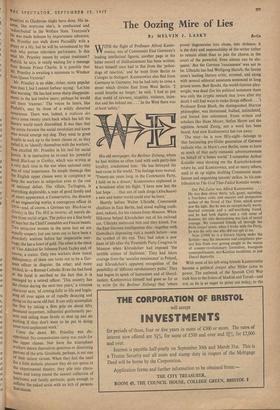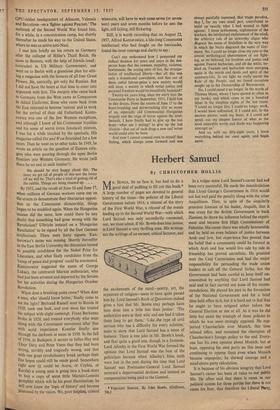The Oozing Mire of Lies
UUTTH the flight of Professor Alfred Kanto- V V rowicz, one of Communist East Germany's leading intellectual figures, another page in the bitter record of disillusionment has been written. Marx himself once had to flee from the 'police- dogs of reaction,' and he went from Berlin to Cologne to Stuttgart. Kantorowicz also fled from Germany to Germany, but he had only to cross a street which divides East from West Berlin. 'I could breathe no longer,' he said. 'I had to put that world of rawness, stupidity, violence, injus- tice and lies behind me.. ..' In the West there was at least 'safety.'
His old newspaper, the Berliner Zeitung, where he had written so often (and with such party-line loyalty), condemned him: 'He has betrayed the best cause in the world.' The feelings were mutual. *Twenty-six years long, in the Communist Party, I held on to a dream,' Kantorowicz explained in a broadcast after his flight. 'I have now lost the last hope . . . that out of such dregs (Abschaum) a new and better world could ever be born.'
Shortly before Walter Ulbricht, Communist chieftain in East Berlin, had stood waiting confi- dent, radiant, for his visitors from Moscow. When Mikoyan helped Khrushchev out of his railroad car, Ulbricht embraced him and they kissed. For the East German intelligentsia this—together with Gomulka's depressing visit a month before—was the symbol of the end. They had taken a new lease of life after the Twentieth Party Congress in Moscow when Khrushchev had exposed 'the terrible crimes of Stalinism.' They had taken courage from the 'socialist renaissance' in Poland, and Khrushchev's apparent recognition of the possibility of 'different revolutionary paths.' They had begun to speak of humanism and of liberal- isation; Kantorowicz himself had gone so far as to write (in the Berliner Zeitung) that 'where power degenerates into abuse, into violence, it is the duty and responsibility of the,writer rather to remain silent than to join the chorus in the court of the powerful. Even silence can be elo- quent.' But the German 'renaissance' was not to be. Ulbricht has had Wolfgang Harich, the Soviet zone's leading literary critic, arrested, and along with several editorial assistants sentenced to long prison terms. Bert Brecht, the world-famous play- wright, was dead (for his political testament there was only the cryptic remark that 'even after my death I will find ways to make things difficult.. . Professor Ernst Bloch, the distinguished. Marxist philosopher, was threatened, bullied, intimidated, and forced into retirement. From writers and scholars like Hans Mayer, Stefan Heym and the sightless Arnold Zweig, not a word has been heard. And now Kantorowicz has run away.
The man—he is now fifty-eight—belongs to that fascinating pre-Hitler generation of German radicals who, in Marx's own Berlin, came to have so much of that early romantic adventurousness on behalf of 'a better world.' I remember Arthur Koestler once showing me the Kuenstlerkolonie where he, and Kantorowicz, and so many others, used to sit up nights drafting Communist mani- festoes and organising tenants' strikes. In his con- tribution to The God That Failed Koestler wrote : Our Pol.-Leiter was Alfred Kantorowicz. . . . He was then about thirty, tall, gaunt, squinting, a free-lance critic and essayist and prospective author of the Novel of Our Time, which never saw the light. But he was an exceptionally warm- hearted comrade and a self-sacrificing friend, and he had both dignity and a rich sense of humour; his only shortcoming was jack of moral courage. We remained friends all through the Paris emigre years; when I broke with the Party, be was the only one who did not spit at me.
Now [1949] he is a literary bigwig under the Soviets—may his innocence and compliance pro- tect him from ever getting caught in the snares of counter-revolutionary formalism, bourgeois cosmopolitanism, neo-Kantian banditism, or just liberal depravity. . . .
With most of his left-wing friends Kantorowicz became a political émigré after Hitler came to power. The outbreak of the Spanish Civil War took him to the fronts of Madrid and Teruel—and not, as he is so eager to point out today, to the GPU-ridden headquarters of Albacete, Valencia and Barcelona—as a 'fighter against Fascism.' The outbreak of the Second World War found him, for a while, in a concentration camp, but shortly thereafter he made his way to the United States, Where he was an active anti-Nazi.
I met him briefly on his return to Germany after the collapse of Hitler's Third Reich. He came to Bremen, with the help of friends (read : comrades) in US Military Government; and went on to Berlin with a grandiose plan for edit- ing a magazine with the licences of all four Great Powers. He, naturally, got only the Russian. But I did not have the heart at that time to enter into argument with him. The emigres who came back to Germany from the West came as Conquerors in Allied Uniforms; those who came back from the East returned to become 'natives' and to work for the revival of their old Fatherland. Kanto- rowicz was one of the few Western exceptions, and although I knew of his Communist loyalties and his sense of secret (even fanatical) mission, I was for a while touched by the spectacle. His magazine called Os! und West flourished for a few Years. Then he went on to other tasks. In 1949, he wrote an article on the question of Eastern refu- gees who were pouring through the open Berlin frontiers into Western Germany. He wrote (will there be no end to such ironies?) :
We should be very happy about this. The more we get rid of people of this sort the better off we will be. That's also a kind of getting rid of the rubble. Things are being cleaned up. . . .
By 1953, and the revolt of June 16 and June 17, When millions of German workers came out on the streets to demonstrate their libertarian opposi- tion to the Communist dictatorship, things began to be muddied again. When the Hungarian masses did the same, how could there be any doubt that something had gone wrong with the Revolution? Ulbricht insisted on a 'Hungarian Resolution' to be signed by all the East German intellectuals. There were forty signers. Kan- torowicz's name was missing. Shortly thereafter in the East Berlin University the discussion turned to possible candidates for the Nobel Prize for Literature, and what likely candidates from the 'Camp of peace and progress' could be nominated. Kantorowicz suggested the name of George Lukacs, the celebrated Marxist esthetician, who had just been arrested and deported by the Soviets for his activities during the Hungarian October Revolution.
When does a breaking-point come? When does a man, who 'should know better,' finally come to see the light? Bertrand Russell went to Russia in 1920, took one look, and ever since has treated the subject with slight contempt. Franz Borkenau broke in 1928, and treated everybody who went along with the Communist movement after that With acrid impatience. Koestler finally saw through the darkness at noon in 1938. In the fall Of 1956, in Budapest, it occurs to Julius Hay and Tibor Dery and Peter Veres that they had been Wrong, terribly and tragically wrong, and that With one great revolutionary break perhaps their fine hopes could still be made good. Somewhere right now (it could be Accra, or Ceylon, or Kerala) a young man is going into a book-store to buy a copy of some little Marxist-Leninist Pamphlet which will be his great illumination; he Will now know the 'logic of history' and become possessed by the vision. We, poor helpless, cynical
wiseacres, will have to wait some seven (or seven- teen) years and seven months before he sees the light, still failing, still flickering.
Still, it is worth recording that on August 22, 1957, Alfred Kantorowicz, a life-long Communist intellectual who had fought on the barricades, found the inner courage and clarity to say :
Can't one understand how I postponed my radical decision for years and years in the des- perate hope that the rawness, stupidity, violence, lawlessness, the oozing mire of -lies, the strangu- lation of intellectual liberty—that all this was only a transitional convulsion, and that out of these awful labour-pains a new society would still issue, a society in which social justice and personal freedom would be beautifully balanced?
Twenty-six years long, since my entry into the Communist Party in September, 1931, I held fast to this dream. From the events of June 17 to the heart-breaking and nerve-racking (for so many of us, especially old Communists) Hungarian tragedy and the reign of terror against the intel- lectuals, I have finally had to give up the last hope—what am I saying? to give up the last illusion—that out of such dregs a new and better world could ever be born.
And now I cannot conceal even to myself that feeling, which always came forward and was
always painfully repressed, that tragic paradox, that I, for my own small part, contributed to build up exactly what I had wanted to fight against: I mean lawlessness, exploitation of the workers, the intellectual enslavement of the mind, the arbitrary rule of an unworthy clique who disgrace the name of Socialism in the very way in which the Nazis disgraced the name of Ger- many. No, I could no longer close my eyes to the almost mythological phenomenon of our fight- ing, as we believed, for freedom and justice and against Fascist barbarism, and all the while, be- hind us, Fascism and barbarism were emerging again in the words and deeds and spirit of the apparatschiks. In our fight we really meant the Rule of the People, and we found ourselves caught up in the Dictatorship of Bureaucrats.
No, I could stand it no longer. In the words of Thomas Mann, whom 1 have quoted so often in my books, and which came to me a hundred times in the sleepless nights of the last years: '1 could no longer live, I could no longer work, I would have suffocated, if I could not, in the ancient phrase, wash my heart, if 1 could not speak out my deepest horror of what in the most miserable words and deeds was happening amongst us.'
And so, with my fifty-eight years, I leave everything behind me once again, and begin anew.



































 Previous page
Previous page